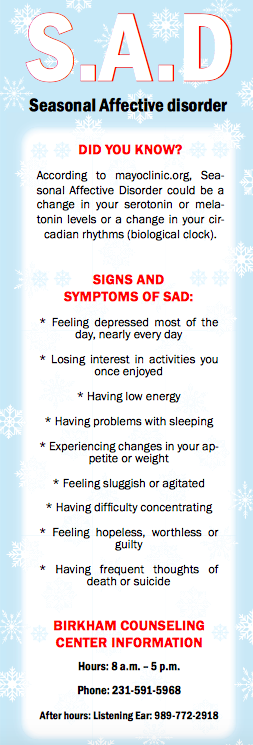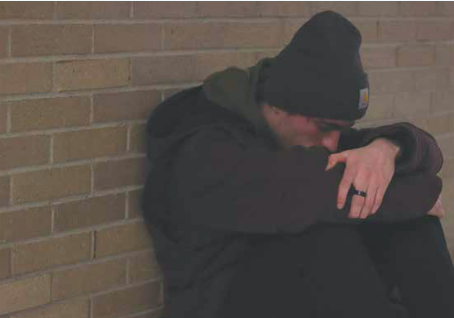By: Alicia Jaimes and Veronica Mascorro
Lifestyles Editor and Interim Reporter

Ferris general studies freshman Kailey Dykstra has noticed a change in mood as Ferris dives deeper into wintertime.
“I would say that, especially during the months of January and February, I feel like it gets so dark outside, it’s so cold and you really have nothing to do besides go to school and do homework,” Dykstra said. “So, I feel like during those times when it’s really dark and cold, I feel like I get the saddest.”
While some students are feeling more of the winter blues this season, it’s important to recognize the signs and symptoms of a more serious affliction, such as Seasonal Affective Disorder (SAD).
According to mayoclinic.org, “Seasonal Affective Disorder (SAD) is a type of depression that’s related to changes in seasons.”
Ferris counselor and assistant professor Andrew Slater sees students throughout the year for various reasons but finds them all equally as important.
“At Birkam, we work with students struggling with all kinds of mental illness and trauma, from transition issues and homesickness to mood and personality disorders,” Slater said. “These sometimes can be connected to the season but can also relate to things like first grades being posted, midterms, finals and other environmental stresses a student may naturally encounter.”
While some stressors may be fleeting, mayoclinic. org recommends seeing a doctor if “you feel down for days at a time and you can’t get motivated to do activities you normally enjoy. This is especially important if your sleep patterns and appetite have changed, you turn to alcohol for comfort or relaxation, you feel hopeless or think about suicide.”

Whether students can relate to these feelings or not, Dykstra believes that discussing mental health during this time is crucial.
“I feel like it’s something that people are afraid to talk about and a lot of people are afraid to speak out about how they really feel. So, I think talking to someone about how you feel can help,” Dykstra said.
Ferris digital animation and game design freshman Mackenzie Smith always takes time for herself when she notices a change in her mood.
“I take some time to myself, and read or do little, simple things to let go of the stresses of the day,” Smith said.
Slater agrees there is importance in self care and revisiting hobbies that you enjoy such as reading, cooking, video games or Netflix when you start to feel a little blue. Another option is to seek methods of tricking your body into producing vitamin D, the depression-fighting vitamin naturally produced by absorbing sunlight, which is in short supply during Michigan winters.
“I have had clients find success using a sun lamp or light bulbs that mimic sunlight,” Slater said. “Prioritizing your mental health the same way you would prioritize your physical is key.”
For those who feel the need to talk with someone regarding their mental health, the Birkam Counseling Center is a free resource for students and is open 8 a.m. — 5 p.m. Monday through Friday. Appointments can be made by contacting them at 231-591-5968.
